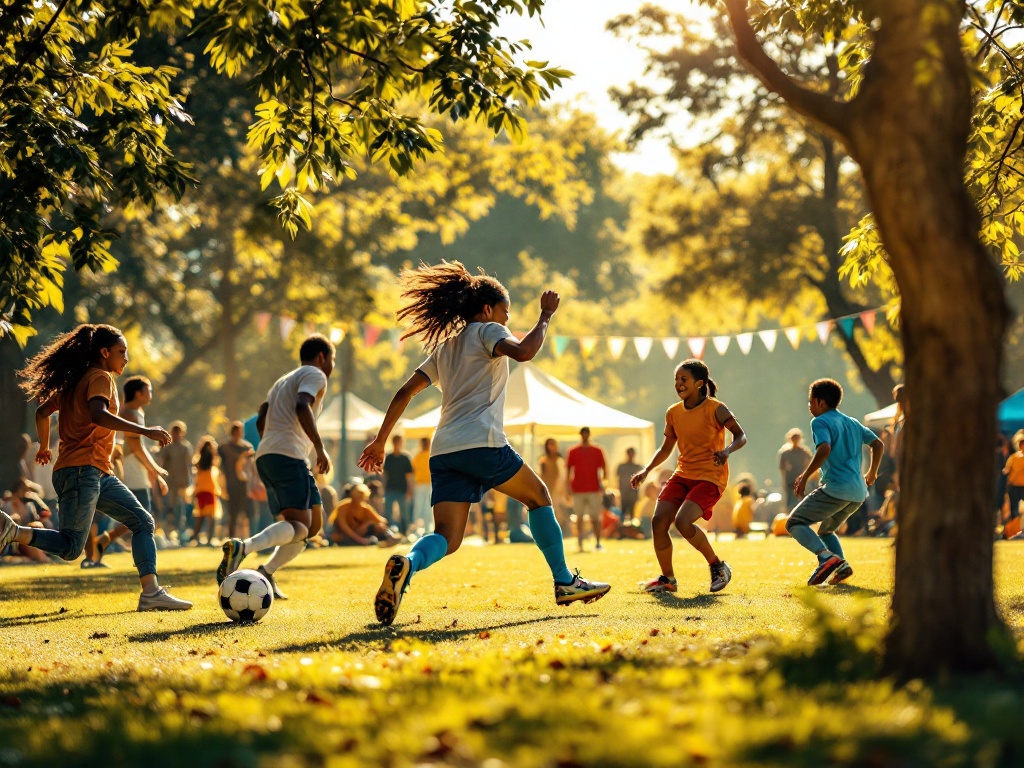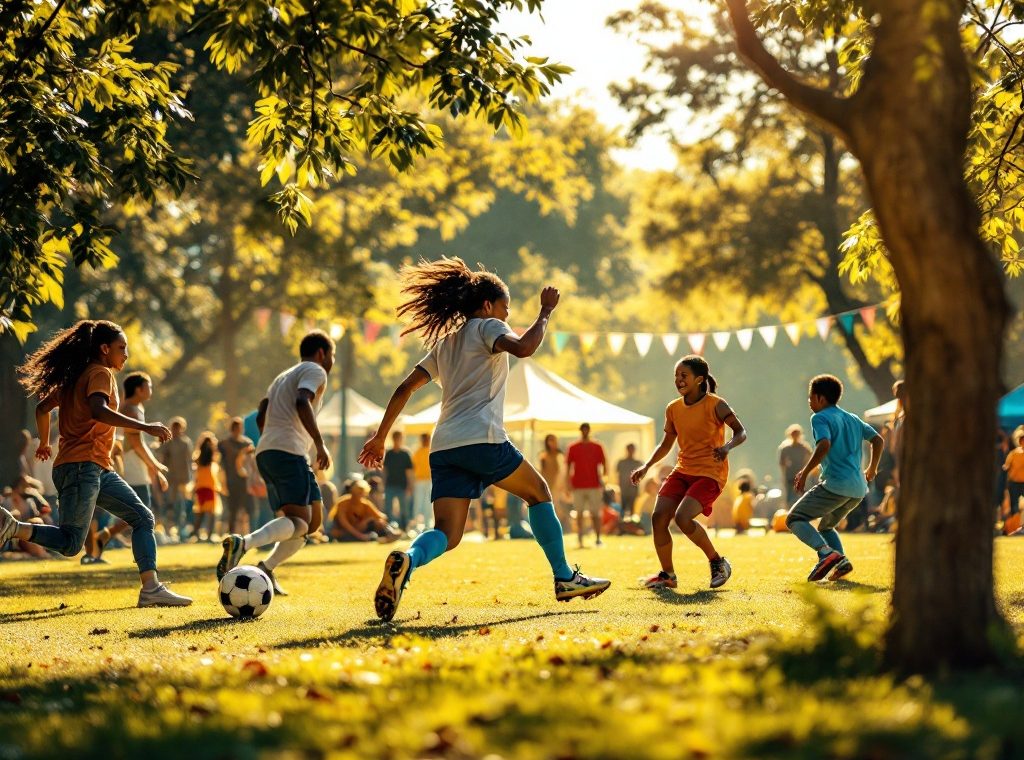How Sport Affects the Society
Discover the profound impact of sports on society, from shaping cultural values and fostering unity to driving social justice and boosting community well-being. Explore how sports reflect our ideals of fair play and teamwork, while also challenging traditional norms and promoting inclusivity. Learn how athletic events bridge cultural divides, creating shared experiences that connect people from diverse backgrounds. Delve into the power of sports to address social issues, advocate for reform, and enhance mental and physical health. Read on to uncover the multifaceted ways sports enrich our lives and strengthen communities.
Important information

- Sports influence societal values by promoting inclusivity and challenging traditional norms, like gender roles.
- Sports act as a bridge between cultures, fostering understanding and a sense of global community through shared experiences like the Olympics.
- Participating in sports offers numerous benefits for mental well-being, including stress reduction, improved mood, and stronger social connections.
- Sports can be a powerful platform for social justice and reform, giving athletes a voice to advocate for change and challenge discrimination.
- Youth sports programs are crucial for developing essential life skills, reducing crime, and enhancing social mobility by improving educational and employment opportunities.
The Cultural Influence of Sports on Society
Sports profoundly influence society, both reflecting and shaping our values. Sporting events often embody ideals like fair play and teamwork, with respect for rules being paramount. For example, cricket emphasizes fair play, highlighting its importance in many cricketing nations. Furthermore, sports can actively shape societal values by promoting inclusivity and challenging traditional gender roles, as seen in the growing popularity of women’s sports. Sports also act as a powerful tool for cultural exchange, bridging divides and fostering understanding. The Olympic Games exemplify this by uniting athletes and spectators from diverse backgrounds, showcasing various cultural traditions, and encouraging intercultural dialogue. Through these shared experiences, sports build connections and foster a sense of global community.
How Sports Reflect and Shape Cultural Values
Sports reflect our values, mirroring ideals such as teamwork, perseverance, and fair play. More than just a reflection, they actively shape these values, fostering discipline, leadership, and respect for opponents. Sporting events powerfully display cultural traditions, igniting national pride while simultaneously bridging cultures and uniting diverse people. Events like the Olympics and the World Cup showcase unique cultures and create shared global experiences. Furthermore, sports provide a platform for cultural exchange, breaking down barriers and promoting inclusivity.
The Contribution of Sport to Cultural Unity and Diversity
Sport unites us, connecting people from diverse backgrounds through shared experiences while celebrating our individuality. Sporting events showcase unique traditions and diverse perspectives, fostering understanding and respect. This dual role strengthens intercultural dialogue and builds social cohesion, bringing us together even as it celebrates our differences.
The Role of Sports in Raising Awareness of Social Issues
Sports often illuminate social issues like racial injustice and gender inequality. Athletes play a crucial role, using their platforms to amplify vital conversations. The world of sports fosters dialogue and encourages engagement on challenging topics. Community sports programs directly address inequality and promote inclusivity, empowering marginalized groups and championing social justice.
Sports and Social Benefits
Physical activity through sports offers significant mental health benefits. Exercise reduces stress, anxiety, and depression while boosting mood and psychological well-being through the release of endorphins. Team sports combat loneliness and isolation by enhancing social interaction and fostering a sense of belonging and improved self-esteem. The structure and routine provided by sports can be especially helpful for individuals facing mental health challenges. Achieving athletic goals, whether individual or team-based, cultivates a sense of accomplishment, further enhancing mental and emotional well-being. Regular participation in sports also improves sleep quality, leading to increased energy and better cognitive function, contributing to overall mental wellness. The social interaction inherent in sports and community involvement builds connections and reduces social isolation, a crucial factor in maintaining good mental health.
Sports play a vital role in strengthening communities. Shared experiences, such as playing or watching sports, bring people together, fostering community cohesion. Local teams become a source of civic pride, while sports clubs offer opportunities for social interaction and relationship development. Volunteering within these organizations nurtures community spirit, and celebrating team achievements strengthens community bonds and creates positive memories. Sports provide common ground for diverse groups to connect, promoting understanding and inclusion. Youth sports programs develop leadership skills and encourage positive behavior. Community sporting events attract visitors, boosting local economies and contributing to the overall well-being of the area.
Improving Mental Health and Well-being
Playing sports offers fantastic stress relief and a significant mood boost. It elevates your self-esteem while combating anxiety and depression. Team sports, in particular, foster social interaction, thus reducing loneliness and isolation. Physical activity releases endorphins, which are natural mood enhancers with a potent impact. Furthermore, teammate support cultivates mental resilience and improves coping mechanisms. Finally, regular exercise promotes better sleep, contributing to overall mental wellness.
Benefits of Playing Sports
- Stress relief and mood boost,
- increased self-esteem,
- combats anxiety and depression.
Team Sports Advantages
- fosters social interaction,
- reduces loneliness and isolation,
- cultivates mental resilience.
Physical activity releases endorphins, natural mood enhancers with a potent impact. Regular exercise promotes better sleep, contributing to overall mental wellness.
Enhancing Community Cohesion and Social Bonds
Sports bring people together, forging strong community bonds through teamwork and shared goals. These shared experiences create a sense of belonging and connection. Local sports events provide excellent opportunities for interaction, sparking new friendships and boosting community well-being. Moreover, these gatherings act as social hubs, further strengthening the community fabric.
Encouraging Inclusion and Fighting Discrimination
Sports combat social inequalities by offering equal opportunities, regardless of background. Inclusive sports programs build respect, understanding, and acceptance of diversity, creating a level playing field for interaction and relationship building across diverse groups, challenging prejudices. Sports provide a platform to address social issues like racism, sexism, and homophobia, promoting positive change. The integration of black athletes into professional sports is a prime example of how sports can challenge racial segregation and discrimination. Furthermore, sports empower marginalized communities. While inequalities still exist, the power of sports to promote social justice, encourage cooperation and teamwork, and teach valuable life lessons like discipline and perseverance remains undeniable.
The Political and Social Implications of Sports
Sports have a remarkable ability to drive social justice and reform, influencing political ideologies and societal beliefs. Athletes, for example, can become powerful advocates, shifting public opinion and pressuring political leaders.
Sports challenge established traditions. The rise of female athletes reshapes views on gender roles, while the inclusive nature of sports combats discrimination, leading to evolved social attitudes and policies. Moreover, sports provide common ground, transcending political and social divides to foster dialogue and understanding.
Sports as a Platform for Social Justice and Reform
Sports have a unique power to promote social justice and reform. Athletes, using their platform, advocate for change and create real impact. Beyond individual advocacy, sports programs strengthen communities and drive positive social change by promoting inclusivity and challenging discrimination, often by encouraging participation from marginalized groups. Community outreach through sports also addresses inequality and actively promotes social justice. Furthermore, sporting events frequently highlight these important issues, becoming powerful catalysts for reform.
The Role of Sports in Civil Rights and LGBT Community Advocacy
Sports have a remarkable ability to drive social change, championing crucial issues like civil rights and LGBT+ advocacy. Influential athletes and teams can raise awareness about discrimination and actively challenge it. Sports also create inclusive environments.
LGBT+ sports leagues provide welcoming spaces for athletes and fans, fostering a sense of community and belonging.
Openly LGBT+ athletes competing in mainstream sports promote acceptance and equality within their respective sports and in broader society.
Their visibility contributes to wider societal shifts, advancing human rights for all and building a more just and equitable world.
Using Sports to Address Political Ideologies and Social Beliefs
Sports challenge political norms and offer fresh perspectives, promoting inclusivity while confronting social beliefs. They break down stereotypes and spark vital conversations.
For example, female athletes defy traditional gender roles, creating meaningful change. The integration of disabled athletes challenges perceptions of ability, redefining “normal.”
Sports provide athletes a platform to advocate for social justice, influencing public discourse on political and social issues.
These actions are significant, driving positive change and even policy reforms.
Sports-Based Interventions and Social Mobility
Youth sports offer incredible benefits, fostering essential teamwork and leadership skills. This builds confidence and reduces stress, ultimately boosting life satisfaction. Moreover, sports programs play a crucial role in reducing crime by providing positive alternatives and promoting good behavior. They also significantly enhance social mobility by improving educational and employment opportunities. For example, playing sports instills valuable traits like discipline and teamwork, which are highly desirable attributes in the professional world. Furthermore, participation creates valuable connections and mentorships that can lead to better education and job prospects, ultimately contributing to upward mobility.
Benefits of Youth Sports
- Develops teamwork and leadership skills.
- Builds confidence and reduces stress.
- Increases life satisfaction.
Impact on Society
- Reduces crime by offering positive alternatives.
- Enhances social mobility through improved opportunities.
- Instills valuable traits like discipline and teamwork.
Sports Engagement and Youth Development
Youth sports offer incredible benefits for children’s development. Playing sports promotes physical health and builds crucial social skills, like teamwork and leadership. It also fosters emotional resilience and discipline. These experiences contribute significantly to personal growth, boosting self-esteem and creating a sense of belonging and accomplishment. Moreover, sports provide a positive outlet for kids’ energy, steering them away from trouble. This involvement nurtures personal development and can even improve academic performance. Student-athletes often develop better focus and time management skills, leading to higher grades. In essence, sports offer a well-rounded approach to youth development, contributing to physical health, social skills, emotional resilience, and academic success.
Improving Life Satisfaction and Pro-social Behavior
Participating in sports has been linked to greater life satisfaction. It cultivates essential social skills like teamwork and respect, which in turn strengthen communities. Sports provide valuable opportunities for personal and social growth that extend beyond physical activity.
Reducing Crime and Reoffending through Sports Programmes
Sports programs offer a powerful way to combat crime, especially among at-risk individuals. This demonstrates their potential for crime prevention. Furthermore, these initiatives can decrease reoffending rates, making them a valuable asset in community development.
Government Policies and Sport Strategy
An active lifestyle is essential, and national sports policies can inspire more people to participate. These policies should focus on making sports accessible and inclusive, giving everyone an opportunity regardless of background or skill level. Real change, however, begins in our communities.
Community sports programs are vital for fostering a love of sports from an early age. Investing in local facilities is crucial, and governments often play a key role by funding sports organizations and implementing programs that promote physical activity in schools and communities. This might involve building new sports centers or offering grants to local clubs.
These initiatives offer numerous advantages:
- they improve public health,
- build national unity,
- help develop future athletes.
Supporting sports at every level creates a healthier, more dynamic society, making it a truly valuable investment.
Promoting Active Lifestyles through National Sports Policies
National sports policies champion an active lifestyle for everyone, offering a wealth of health benefits. Regular exercise diminishes the risk of chronic illnesses such as heart disease and diabetes. Beyond physical well-being, sports participation enhances mental health by reducing stress and elevating mood. Many countries invest in sports programs, funding essential resources like facilities, equipment, and coaching to facilitate broader access. These initiatives also promote sports within schools and communities, encouraging participation from people of all ages and abilities. These policies strive to cultivate a healthier and more active populace, recognizing that an active lifestyle benefits everyone.
Ensuring Accessibility and Inclusion in Sports
National sports policies prioritize inclusive access, creating opportunities for everyone regardless of disability, background, or socioeconomic status. Adaptive sports programs and financial aid initiatives help break down barriers to participation. Furthermore, these policies champion gender equality, ensuring everyone can experience the positive impacts of sports.
Supporting Grassroots and Community Sports
Grassroots sports offer incredible social benefits, building essential skills and promoting a healthy lifestyle. Community programs provide accessible and affordable ways for everyone to get involved, regardless of age or skill level. This inclusive environment contributes significantly to overall community health and well-being. Furthermore, these programs strengthen community ties, bringing people together and fostering a sense of belonging. They also encourage teamwork and collaboration. Local sports clubs play a crucial role in nurturing young talent and providing opportunities for aspiring athletes.













